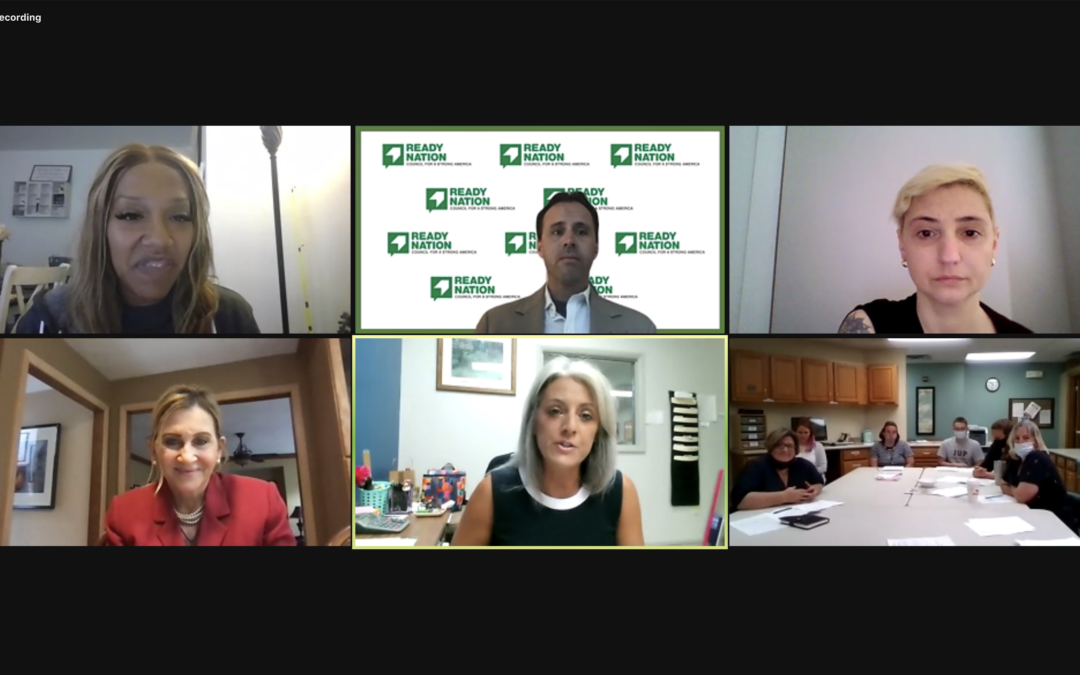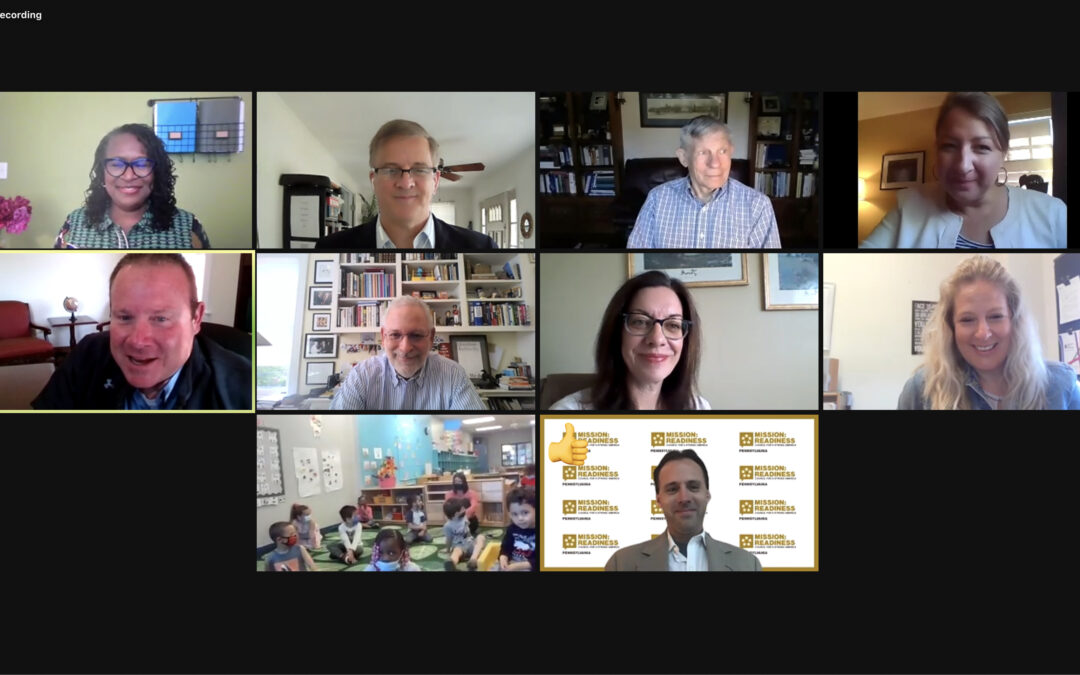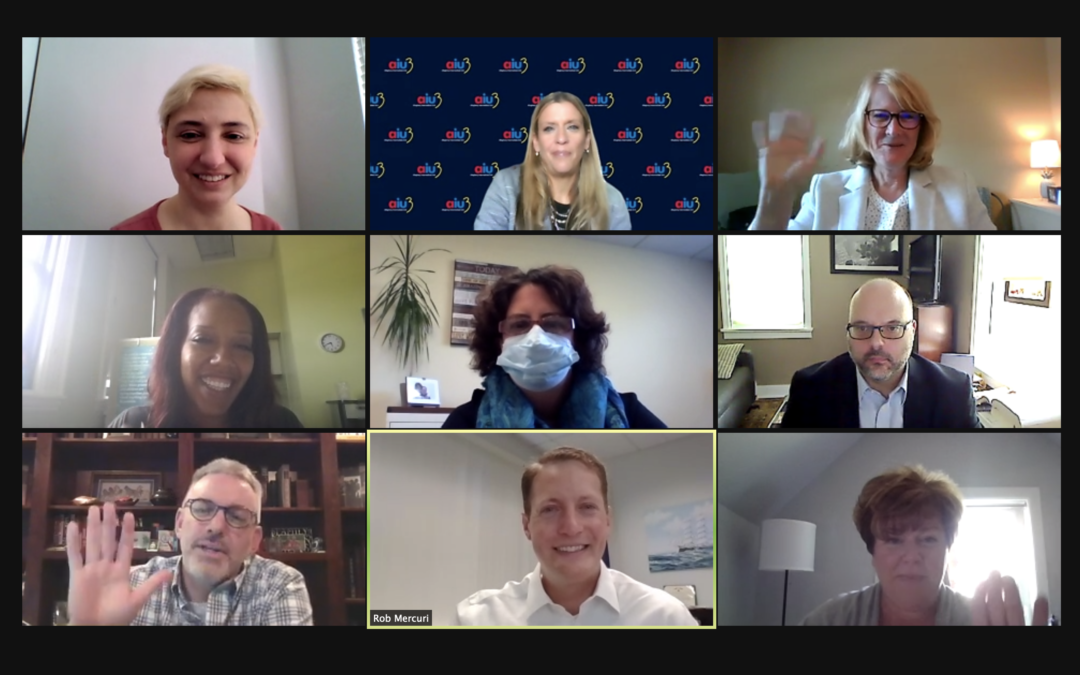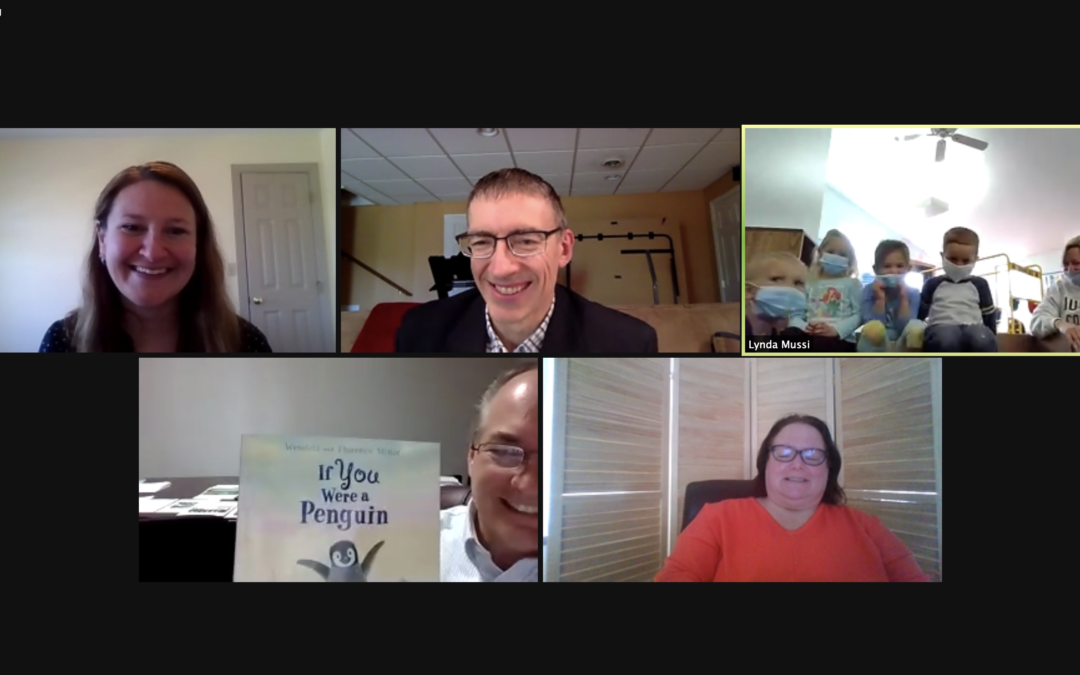
Early Care and Education in Governor Wolf’s 2022-23 State Budget Proposal
HARRISBURG, PA (February 9, 2022) – Today, the principal partners of Early Learning Pennsylvania (ELPA), a statewide coalition of advocates focused on supporting young Pennsylvanians from birth to age five, issued the following statements regarding Governor Tom Wolf’s 2022-23 state budget proposal. ELPA operates four issue-based advocacy campaigns: Pre-K for PA, Start Strong PA, Childhood Begins at Home and Thriving PA.
Wolf Proposal Continues to Expand Pre-K Access
Pre-K for PA applauds the $60 million state funding increase for Pre-K Counts and $10 million increase for Head Start Supplemental Assistance as proposed by Gov. Wolf in the 2022-23 state budget. This funding continues the commonwealth’s tradition and Gov. Wolf’s unwavering commitment of expanding access to high-quality pre-k. This $70 million proposal expansion could provide this once-in-a-lifetime opportunity to more than 2,300 additional young learners.
Research shows that high-quality pre-k benefits children’s cognitive, social, and emotional development and confirms the commonwealth’s investment in pre-k pays dividends for the children fortunate enough to access it. This investment is not only essential for our children, but high-quality early education supports labor force participation, healthy families and a globally competitive workforce of the future. By increasing pre-k access and opening the door to more families, our economic recovery reaps the benefits.
Pre-K for PA now urges the legislature to include the full $70 million for high-quality pre-k in the state budget— Pennsylvania’s youngest learners depend on it.
Budget Proposal Fails to Adequately Invest in Child Care
The Wolf Administration’s budget proposal is an inadequate response to the current child care crisis and misses an important opportunity to help working families in search of affordable high-quality care. Furthermore, failure to fully stabilize the child care sector jeopardizes the efforts of Pennsylvania businesses trying to rehire their labor force. Child care programs are closing classrooms and entire facilities due to teacher and staff shortages. Child care staff are overworked and underpaid with the average child care teacher making less than $11 per hour.
The Governor’s budget proposal does utilize federal funds to sustain the current fiscal year’s child care subsidy rate increase, reduction in parent co-payments and incentives for providing non-traditional hour care. While these steps are important, they are not sufficient, especially in light of flat funding for Pennsylvania’s Child Care Services and Child Care Assistance line items for the third consecutive year.
Start Strong PA urges state policymakers to allocate a portion of the projected year-end surplus of $2.8 billion to address staff recruitment and retention and increase access to quality care for working families, specifically for infants and toddlers.
Governor’s Home Visiting Proposal Marks Recommitment to Investments
Childhood Begins at Home is pleased with the $15 million increase for home visiting in the Department of Human Services (DHS) budget to serve an additional 3,800 pregnant women, children, and families. Voluntary evidence-based home visiting, funded in part by the Community-Based Family Center line, is backed by decades of research. The programs have been a lifeline for families in every legislative district during the pandemic.
The six state-funded models that deliver evidence-based home visiting are currently competitively applying for contracts as part of Pennsylvania’s Family Support Programs, which is a crucial part of the equation in serving more families. Following two years of level funding, the campaign is pleased to see Gov. Wolf’s proposed investment that restarts his commitment to increasing service levels beyond the 5% of Pennsylvania families currently served.
Address Highlights Importance of Perinatal and Child Health
When mothers are healthy, children are healthy. That is why ensuring individuals have access to insurance before, during, and after their baby’s birth is vitally important and can have lasting impacts on health outcomes. The proposed state budget includes funding to expand the postpartum coverage period in Medicaid from 60 days to 12 months, which the Thriving PA campaign welcomes. Medicaid is a significant source of insurance for Pennsylvania women and birthing individuals— especially for women of color— so expanding coverage to a full year postpartum is a vital step towards closing racial and health disparities.
Additionally, we must ensure all children birth through age five with developmental delays are identified, referred to and accepted for the services they need to reach their fullest potential. The proposed state budget includes an increase of $11.5 million for the Early Intervention Part C (infant and toddler) program in the Department of Human Services budget, which includes $1.2 million to specifically add an eligibility category for tracking children in early intervention with mothers who screen positive for maternal depression or anxiety. The Early Intervention Part B (age three to five) program in the Department of Education (PDE) budget is level-funded in the governor’s proposal.
Governor Wolf’s state budget proposal included:
- $60 million in additional funding for the state’s Pre-K Counts program.
- $10 million in additional funding for the Head Start Supplemental Assistance Program. Together, this $70 million expansion could serve approximately 2,300 additional young children.
- Level funding for the state Child Care Assistance and Child Care Services line items.
- $77.7 million in federal funding to sustain child care subsidy base rates.
- $44.3 million in federal funding to sustain the reduction in out-of-pocket family co-payments.
- $6.1 million in federal child care funding to sustain the incentive for providing non-traditional hour care.
- $30 million in state funding to provide state employees with increased access to and affordability of child care through the Department of General Services.
- $15 million in additional funding for evidence-based home visiting in the Community-Based Family Center line item as well as $8 million in one-time federal stimulus funds specified for home visiting.
- Funding allocated for postpartum coverage extension for women in Medicaid from 60 days to 12 months.
- $11.5 million in increased funding for the Early Intervention Part C (infant and toddler) program through DHS, with $1.2 million allocated for children eligible for tracking when their mothers have a positive screen for postpartum depression or anxiety.
- Level-funding for the Part B Early Intervention program (age three to five) offered through PDE.
About Pre-K for PA
Pre-K for PA launched in 2014 with the vision that every 3- and 4-year-old in Pennsylvania will have access to high-quality pre-k. Learn more at www.prekforpa.org.
About Start Strong PA
Start Strong PA launched in 2019 to support healthy child development, working families, and the economy by increasing access to and affordability of high-quality child care programs for young children. Learn more at www.startstrongpa.org.
About Childhood Begins At Home
Childhood Begins At Home is a statewide campaign launched in 2017 to help policymakers and the public understand the value of evidence-based home visiting and support public investments in the programs. Learn more at www.childhoodbeginsathome.org.
About Thriving PA
Thriving PA is a perinatal and child health campaign launched in 2021 and is working to ensure each birthing person, infant, and toddler in Pennsylvania has the opportunity for affordable, quality health care access. Learn more at www.thrivingpa.org.

HARRISBURG, PA (June 25, 2021) – The principal partners of Early Learning Pennsylvania (ELPA), a statewide coalition of advocates focused on supporting young Pennsylvanians from birth to age five, believes the commonwealth’s economic recovery hinges on helping working families by prioritizing greater state investments in high-quality pre-k, child care and evidence-based home visiting. ELPA operates four issue-based advocacy campaigns: Pre-K for PA, Start Strong PA, Childhood Begins at Home and Thriving PA. Reaction statements from three of these campaigns regarding the FY 2021-22 state budget follow:
PRE-K
“Pre-K for PA applauds the $25 million in new state funding for Pre-K Counts and $5 million for Head Start Supplemental Assistance as part of the 2021-22 PA State Budget. This funding continues the commonwealth’s tradition of expanding access to high-quality pre-k – providing this once-in-a-lifetime opportunity to more than 3,200 additional young learners.
“Research shows that high-quality pre-k benefits children’s cognitive, social and emotional development. A new study by the University of North Carolina Chapel Hill confirmed that the commonwealth’s investment in pre-k pays dividends for the children fortunate enough to access pre-k through the Pre-K Counts program. In language and math skills, the study showed that these kids outperformed their kindergarten peers who did not enjoy access—an advantage that equated to four to five months of learning gains. Even with this budget increase, more than 100,000 eligible three- and four-year-olds still lack access to high-quality pre-k.”
CHILD CARE
“The General Assembly and the Wolf Administration unfortunately missed the opportunity to prioritize families who are struggling to return to work. Ignoring recommendations developed with input from over 1,000 child care providers and parents, Pennsylvania’s elected leadership has fallen significantly short on ensuring American Rescue Plan child care funds are used to help families find and afford high-quality child care and to stabilize the industry.
“Given that 70% of Pennsylvania children under the age of five had all adults in their household in the labor force prior to the pandemic, high-quality child care is an essential workforce support. That workforce must be able to return to work for Pennsylvania to recover from the pandemic’s economic devastation.
“We now call on the Wolf Administration to prioritize and implement our recommendations for Pennsylvania’s $1.2 billion in American Rescue Plan child care funding. With nearly 700 child care programs permanently closed and over 350 temporarily closed, families are struggling to find child care. Those child care providers that have managed to stay open are still incurring additional pandemic-related costs while operating significantly under capacity and are struggling to attract and retain teachers.
“Not only is there less child care capacity in the system, only 42% of certified child care capacity currently meets high-quality standards. And only 39% of infants and toddlers that receive subsidized care attend programs that have met high-quality standards. High-quality care and education mean safer, healthier children and are critical to maximizing the period of a child’s most rapid brain growth.
“Start Strong PA’s recommendations for American Rescue Plan child care funding will stabilize, strengthen and ultimately secure the child care industry. This industry is critical to the success of our economic recovery.”
EVIDENCE-BASED HOME VISITING
“On behalf of the pregnant women, children, and families who would benefit the most from evidence-based home visiting – especially those disproportionately impacted by the pandemic – Childhood Begins at Home is dismayed that there is no increase in the state budget for these voluntary services backed by decades of research.
“Without funding increases to reach more Pennsylvania families, the unmet need remains at a staggering 95%. The Community-Based Family Centers line will be level-funded, and the Nurse-Family Partnership line will receive a minimal increase to restore the line to its prior level due to a slight reduction resulting from the state using enhanced Federal Medical Assistance Percentage (FMAP) funding last year.
“Throughout budget negotiations, policymakers emphasized the infusion of federal stimulus dollars to inform state spending decisions. Of the total amount of one-time state funds Pennsylvania received from the American Rescue Plan ($7.3 billion), home visiting gets less than .02% (or a paltry $1.3 million) through the Maternal, Infant, and Early Childhood Home Visiting (MIECHV) Program. This funding has yet to be distributed to programs that received no aid during the COVID-19 pandemic, and is limited in its use and timeframe to spend these dollars.
“Only pennies on the dollar for evidence-based home visiting are coming in federally. It adds insult to injury that policymakers in the legislative and administrative branches did not step up and recognize constituents would benefit from the same services that have been a lifeline for so many during the last 15 months.
“While states’ use of the ARP funds is flexible, the federal stimulus funding for evidence-based home visiting would not even reach one family in each of Pennsylvania’s 253 legislative districts.
“From birth to age five, brain growth is rapid, learning is happening, and our coalition of advocates is committed to ensuring that families can access it in high-quality, developmentally appropriate settings. In Pennsylvania, funding has not been prioritized to ensure the resources are there to offer these irreplaceable opportunities, creating deep inequity among children and their families at a very early age. We, and our tens of thousands of supporters, will continue to urge lawmakers to invest in early learning boldly – it is an urgent necessity.”

LATROBE, PA (June 2, 2021) – Latrobe Kinder-Schull welcomed PA State Senator Kim Ward and local leaders today for a virtual tour and conversation on the challenges of providing pre-k during the COVID-19 pandemic. Local leaders spoke to Senator Ward about the continued need to serve the more than 2,195 eligible children across Westmoreland County who still lack access to this once-in-a-lifetime learning opportunity.
“You don’t have to sell me on the importance of early education, I’m already sold on that,” Senator Ward said. “I think if we are not taking care of our young kids, we are derelict in our duty, if we’re not giving them the best start that we can.”
Eva Wood, Director at Latrobe Kinder-Schull offered a glimpse into life at an early learning center during COVID—describing both visually and verbally how providers have been supporting our children, families, and businesses during this unique year. Joining her in the discussion were Briana Tomack, President & CEO at Greater Latrobe-Laurel Valley Chamber of Commerce, Shirley Hough, Director at Our Buddy’s Place, Mary Anna Pitner, Director at SPHS Child Learning Center and Lindsey Ramsey and Cristina Codario at Trying Together.
“We need to help childcare and preschool programs reach high quality, and in order to do that there are financial burdens that have to be hurdled,” said Wood. “I think with providing that financial support, facilities will be able to reach those standards.”
Speakers made it clear that despite the challenges associated with COVID, early care and education is working and is supported by the Latrobe community. Briana Tomack, who participated in the discussion, offered her unique business perspective, and agreed that high quality early learning promotes not just the hard skills like math, reading, writing and science—but the increasingly important soft skills—communication, collaboration, and critical thinking.
“Kids that attend high quality early learning are more likely to succeed, stay on track academically, graduate from high school, pursue higher education career training and become productive workers,” said Tomack. “This is why many business leaders across Pennsylvania are supportive of early learning iniatives.”
A new study by the University of North Carolina Chapel Hill confirmed that the commonwealth’s investment in pre-k is paying dividends for the children fortunate enough to access pre-k through Pennsylvania’s Pre-K Counts program. In language and math skills, the study showed that these kids outperformed their kindergarten peers who did not enjoy access—an advantage that equated to four to five months of learning gains, which is a substantial difference in development at that age.
Governor Wolf’s proposed 2021-22 PA budget includes a $25 million increase for Pre-K Counts and $5 million increase for the Head Start State Supplemental Assistance Program, which continues the tradition of expanding access to high quality pre-k. This new funding will allow 3,271 additional children to enroll in these high-quality early learning programs.
Pre-K for PA is an issue campaign supported by individuals and organizations across Pennsylvania who believe that investing in our children is the right choice and an urgent necessity. Our vision is that every 3- and 4-year-old in Pennsylvania will have access to high-quality pre-k. For more information www.prekforpa.org.
# # #

Lancaster, PA (June 1, 2021) – Community Action Partnership of Lancaster County welcomed PA State Senator Scott Martin and local leaders today for a virtual tour and conversation on the challenges of providing pre-k during the COVID-19 pandemic. Local leaders spoke to Senator Martin about the continued need to serve the more than 7,000 eligible children across Lancaster County who still lack access to this once-in-a-lifetime learning opportunity.
“I absolutely support efforts to increase capacity that we need and right now they’re needed more than ever,” Senator Martin said. “We can’t get a lot of people back to work if they don’t have good options related to their young children, you can count on my support.”
Stacy Lewis, Director at Head Start Programs Community Action Partnership offered a glimpse into life at an early learning center during COVID—describing both visually and verbally how providers have been supporting our children, families, and businesses during this unique year. Joining her in the discussion were Lieutenant General (Ret.) Dennis L. Benchoff, U.S. Army, Robert Krasne, Chairman & CEO at Steinman Communications, Steve Doster, State Director at Mission: Readiness, Kim Early, Director of Advocacy and Public Policy at PennAEYC, Blair Hyatt, Executive Director at Pennsylvania Head Start Association, and Jan Schwartz, Outreach Director at PennAEYC.
“Prior to the pandemic, approximately one in four children had access to a funded pre-k high quality program, and what we know now is that since the pandemic we are actually at a net loss for childcare providers in Lancaster County.” said Lewis. “While some new centers have opened, those that have called close their doors, either on an interim basis or permanently, still outnumbers the new programs, so we are currently down fifteen licensed providers.
Speakers made it clear that despite the challenges associated with COVID, pre-k is working and is supported by the Lancaster County community. Both Robert Krasne and General Benchoff participated in the tour and discussion. From two different perspectives, they both agreed that high quality pre-k promotes not just the hard skills like math, reading, writing and science—but the increasingly important soft skills—communication, collaboration, and critical thinking.
“Early childhood education addresses two issues coincidentally. First, it gets Pennsylvania’s children off to a great start in life, helps make them lifelong learners, and prepares them to be great in school and beyond. At the same time, by enabling young children to go into early childhood education programs, it enables their parents or caregivers to get time back so that they can reenter the work force,” Krasne said. “You can invest in the future workforce and invest in expanding the present workforce.”
Enthusiasm for early education was echoed by General Benchoff. “We see the lack of qualifications for military service or any other type of good job that individuals like to do once they graduate from high school as being better addressed by early childhood education and preschool programs,” Benchoff said.
A new study by the University of North Carolina Chapel Hill confirmed that the commonwealth’s investment in pre-k is paying dividends for the children fortunate enough to access pre-k through Pennsylvania’s Pre-K Counts program. In language and math skills, the study showed that these kids outperformed their kindergarten peers who did not enjoy access—an advantage that equated to four to five months of learning gains, which is a substantial difference in development at that age.
Governor Wolf’s proposed 2021-22 PA budget includes a $25 million increase for Pre-K Counts and $5 million increase for the Head Start State Supplemental Assistance Program, which continues the tradition of expanding access to high quality pre-k. This new funding will allow 3,271 additional children to enroll in these high-quality early learning programs.
Pre-K for PA is an issue campaign supported by individuals and organizations across Pennsylvania who believe that investing in our children is the right choice and an urgent necessity. Our vision is that every 3- and 4-year-old in Pennsylvania will have access to high-quality pre-k. For more information www.prekforpa.org.
# # #

Pittsburgh, PA (May 20, 2021) – Allegheny Intermediate Unit’s Pre-K Counts Program and Bright Horizons at UPMC Passavant welcomed PA State Representative Rob Mercuri and local leaders today for a virtual tour and conversation on the challenges of providing pre-k during the COVID-19 pandemic. Local leaders spoke to Rep. Mercuri about the continued need to serve the more than 6,000 eligible children across Allegheny County who still lack access to this once-in-a-lifetime learning opportunity.
“Those years between zero and five are critical,” Rep. Mercuri said. “The intent and the result of the programs of pre-k put young people on the right path and the return on investment from those early years are very meaningful.”
Chris Rodgick, Program Director at Allegheny Intermediate Unit’s Pre-K Counts offered a glimpse into life at an early learning center during COVID—describing both visually and verbally how providers have been supporting our children, families, and businesses during this unique year. Joining her in the discussion were Jeanette Casciato, Assistant Director at Allegheny IU Pre-K Counts, Heather Pfister, Center Director at Bright Horizons at UPMC Passavant, Jake Witherell, Chief Operating Officer at Schell Games, Cristina Codario, Public Policy Regional Coordinator at Trying Together, and Lindsey Ramsey, Public Policy Regional Coordinator at Trying Together.
“These children are meeting or exceeding widely held expectations, so that proves that having class with each other in a preschool setting, mixed age grouping, with trained professional staff really does support the excellent work that we want children to have before they go to kindergarten.” said Rodgick.
Speakers made it clear that despite the challenges associated with COVID, pre-k is working and is supported by the Allegheny County community. Jake Witherell, who participated in the tour and discussion, offered his unique business perspective, and agreed that high quality pre-k promotes not just the hard skills like math, reading, writing and science—but the increasingly important soft skills—communication, collaboration, and critical thinking.
“I’ve never understood why more focus isn’t on high quality early learning and putting money there because that’s the best investment,” Witherell said. “These high quality early learning programs are key in cementing those skills early in a child’s life.”
A new study by the University of North Carolina Chapel Hill confirmed that the commonwealth’s investment in pre-k is paying dividends for the children fortunate enough to access pre-k through Pennsylvania’s Pre-K Counts program. In language and math skills, the study showed that these kids outperformed their kindergarten peers who did not enjoy access—an advantage that equated to four to five months of learning gains, which is a substantial difference in development at that age.
Governor Wolf’s proposed 2021-22 PA budget includes a $25 million increase for Pre-K Counts and $5 million increase for the Head Start State Supplemental Assistance Program, which continues the tradition of expanding access to high quality pre-k. This new funding will allow 3,271 additional children to enroll in these high-quality early learning programs.
Pre-K for PA is an issue campaign supported by individuals and organizations across Pennsylvania who believe that investing in our children is the right choice and an urgent necessity. Our vision is that every 3- and 4-year-old in Pennsylvania will have access to high-quality pre-k. For more information www.prekforpa.org.
# # #

STATE COLLEGE, PA (May 11, 2021) – Pre-K Counts provider The Learning Station welcomed PA State Representative Kerry Benninghoff and local leaders today for a virtual tour and conversation on the challenges of providing pre-k during the COVID-19 pandemic. Local leaders spoke to Rep. Benninghoff about the continued need to serve the more than 900 eligible children across Centre County who still lack access to this once-in-a-lifetime learning opportunity.
“I’ve raised five children, and now have eight grandchildren, so I am obviously very interested in the investment we make it our children, and I continue to advocate for that in my time in Harrisburg,” Rep. Benninghoff said. “Even in some more economic bleak times, we’ve tried to continue to do that.”
Lynda Mussi, Executive Director of The Learning Station, offered a glimpse into life at an early learning center during COVID—describing both visually and verbally how providers have been supporting our children, families, and businesses during this unique year. Joining her in the discussion were Michael Danneker, Township Manager for Spring Township, Jenn DeBell, Executive Director for Pennsylvania Association for the Education of Young Children (PennAEYC), Bruce Clash, State Director of Fight Crime: Invest In Kids, and Tracy Weaver, Outreach Coordinator, PennAEYC.
“We still have many, many obstacles, but we believe heavily that early education is the most fundamental and the most important investment that we can provide for our children,” said Mussi.
Speakers made it clear that despite the challenges associated with COVID, pre-k is working and is supported by the Centre County community. Michael Danneker, who participated in the tour and discussion, offered his unique law enforcement perspective, and agreed that high quality pre-k promotes not just the hard skills like math, reading, writing and science—but the increasingly important soft skills—communication, collaboration, and critical thinking.
“Being in law enforcement for so long, I think that really there is no substitute for pre-k. I think it’s so important the way it lays out the foundation for kids and how they achieve in the future,” Danneker said. “I can’t say enough about how every little piece counts, and every dollar we spend is an investment—invest in our kids, so we have a positive future for them.”
A new study by the University of North Carolina Chapel Hill confirmed that the commonwealth’s investment in pre-k is paying dividends for the children fortunate enough to access pre-k through Pennsylvania’s Pre-K Counts program. In language and math skills, the study showed that these kids outperformed their kindergarten peers who did not enjoy access—an advantage that equated to four to five months of learning gains, which is a substantial difference in development at that age.
Governor Wolf’s proposed 2021-22 PA budget includes a $25 million increase for Pre-K Counts and $5 million increase for the Head Start State Supplemental Assistance Program, which continues the tradition of expanding access to high quality pre-k. This new funding will allow 3,271 additional children to enroll in these high-quality early learning programs.
Pre-K for PA is an issue campaign supported by individuals and organizations across Pennsylvania who believe that investing in our children is the right choice and an urgent necessity. Our vision is that every 3- and 4-year-old in Pennsylvania will have access to high-quality pre-k. For more information www.prekforpa.org.
# # #








